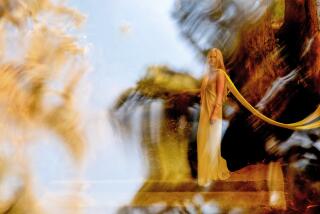The Building of Work and Love : THE ONE DAY : A Poem in Three Parts <i> by Donald Hall (Ticknor & Fields: $16.95, cloth; $8.95, paper: 67 pp.) </i>
- Share via
Once in a great while a book of poems comes along and one feels that a time has been spoken for. Such is the happy occasion with Donald Hall’s “The One Day,” a book that recently, deservedly, received the National Book Critics Circle Award in poetry. A book-length poem in three parts, “The One Day” has about it the wicked satire of a Tom Wolfe, an Old Testament razzmatazz of rant, a prophetic energy akin to Allen Ginsberg’s “Howl,” and a lyricism which bears Hall’s fully developed signature. One thinks of books, among contemporaries, such as Galway Kinnell’s “The Book of Nightmares” or A. R. Ammons’ “Sphere,” to compare how both ambition and the brickwork of construction might meld themselves into a single structure and presence.
With Picasso’s assertion that “Every human being is a colony” as its credo, “The One Day” is built within an arc of juxtaposed shifts that advance elliptically a multiple protagonist, an almost simultaneous speaking of characters who waft in and out, and the undersong of the book is the choral pitch of so many attempting to do what they want to do. In the very form of the book, Hall rejects the notion of any single self--that warm, cuddly construct which, could we only attain it, would release us from our multiplicity. “A bed is the world,” Hall says, and it is also the comings and goings of Eros that give ground to the mounting drama of the book. Tonally, it’s as if the poignant meditative repose of T. S. Eliot’s “Four Quartets” has met up again, as old friends, with the violent montage form of Eliot’s “The Wasteland.”
Hall has long kept his eye and ear upon what is old, what is historical, what seems behind us yet is still living with us, and with “The One Day” he moves out into a different terrain from his recent mature books, “Kicking the Leaves” and “The Happy Man.” His ear is still wrapped around the sounds of words and there is a characteristic adherence to the marked rhythms wherein time itself is given form, but the mordant and bloody-minded surge of much of “The One Day” has about it a much surer sense of drama and its through-lines. This is a refinement over his earliest poetry, which was sometimes marred by its own precosity and use of irony, particularly where that irony could not find the means to dramatize itself and find full closure.
Characters and images of stasis and torpor haunt the beginning of the book, lives prevented by the disappointment that was theirs to inherit, lives now grown into an American culture where idleness and entropy are seen to prevent any authentic love or real work. Busyness has become business, and passion is sublimated into distraction and an entertainment unto death. One of the most inspired sections of “The One Day” is the poem “Pastoral,” in which a mock-shepherd and shepherdess pipe their song of adultery back and forth to each other--easily some of the funniest and most wincing writing about adultery, and about the suburbs in general, I’ve ever read. Byron once said, “If fools be my theme, let satire be my song,” but as “The One Day” moves toward its climax we know that fools are not here Hall’s theme. His writing is invaded by a sympathy for all that lives, even as satire and rage hover everywhere about what seems, often, only our ridiculous enduring of ourselves.
The final section of the book, “To Build a House,” is in fact a coming to terms with the soul’s need for repose, based on that “third thing” we look out upon in the mix of our love and building. “Work, love, build a house, and die,” Hall writes, “But build a house.” The artistry of “The One Day” is itself evidence of such a triumph of real work, and I suspect those of us who come to poetry for an ultimate spareness of expression--and for even another reason: wisdom--will be pulling this book from our shelves for some time. It will even revive those who think they hate poetry, who are convinced they really can’t stand The Stuff.
More to Read
Sign up for our Book Club newsletter
Get the latest news, events and more from the Los Angeles Times Book Club, and help us get L.A. reading and talking.
You may occasionally receive promotional content from the Los Angeles Times.







